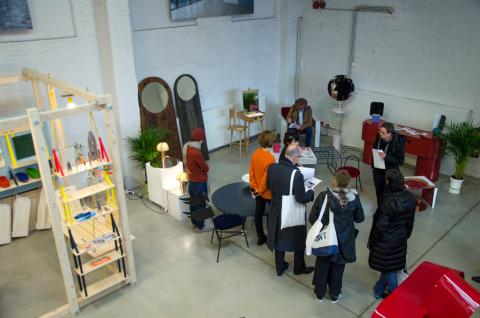
A group of Georgian interior designers and furniture producers is in Cologne, Germany, this week – the first time that Georgian designers showcase their products at the Designers Fair during Passagen Interior Design Week, Germany’s largest annual design event. Meanwhile, Georgian furniture manufacturers are also visiting leading German furniture producers to explore the potential for cooperation, and are learning about the current trends in furniture manufacturing by visiting IMM Cologne, the world’s most important furnishing show.
The group includes architect and interior designer Anuka Tavartkiladze, Designbureau’s Nia Mgaloblishvili, Sophio Shevardnadze and Ia Liparteliani, Sandro Tsivtsivadze from the ecology-oriented family business Funduki, Levan Lominashvili from XYZ Integrated Architecture and furniture producers Avangardi, Eurostyle XXI, Madera LG.
All are members of the Georgian Furniture Cluster (GFC), which was established in 2017 with the support of the European Union and its EU4Business initiative. GFC members already visited IMM and Passagen two years ago, but this time they are participating in an exhibition with their unique products, most of which have been produced by the cluster member companies. This represents yet another example of an effective collaboration between designers and producers united in the cluster.
The participation of Georgian designers in Passagen 2019 takes place under the brand of 'Design Georgia' and is organised by Enterprise Georgia, an agency of the Ministry of Economy and Sustainable Development of Georgia. Enterprise Georgia supports the cluster through a range of activities.
Georgian designers have come into international focus of the Designers Fair this year. The 'Design Georgia' exhibition has been listed among the Top 10 places to visit at the fair along with some of the world’s most renowned designers. All four design studios have also made a list of 22 nominees for the Passagen Prize for up-and-coming designers.
Vital experience
“Participation in such exhibitions is very important for further development of Georgian product design. For our company this is a very interesting experience, as we learn firsthand about how companies and designers present their products and market them. We also receive some feedback from the visitors, which will guide our company in meeting needs of the European market,” says Nia Mgaloblishvili from Designbureau.
This opinion is shared by architect and interior designer Anuka Tavartkiladze: “For us being here is an opportunity to discover new partners on the European market. This proves that our products are compatible with the expectations and standards on the European market," she said.
Parallel to the fair, Georgian furniture producers have been invited by Hettich Group, one of the world's leading manufacturers of furniture fittings, to visit their factory near Cologne. Hettich Group is now looking for new suppliers for intermediate products, and prospects for cooperation with the Georgian manufacturers are being discussed.
Georgian Furniture Cluster
The Georgian Furniture Cluster unites 40 Georgian designers and furniture producers. It was established with support of the 'SME Development and DCFTA in Georgia' project, which is financed by the European Union and German government and implemented by GIZ as part of EU4Business.The purpose of the cluster is to help individual entrepreneurs and companies overcome challenges by joining their efforts and resources, to bring furniture and interior designs from Georgia to Europe and beyond.
The 'SME Development and DCFTA in Georgia' project assists Georgian small and medium-sized enterprises (SMEs) to become more competitive and adapt to the new regulatory environment created under the EU Deep and Comprehensive Free Trade Agreement (DCFTA). The project is part of European Union's EU4Business Initiative, which brings together all EU programmes assisting SME and private sector development in Georgia. EU4Business enables the private sector to take advantage of the opportunities offered by the DCFTA, which gives Georgia access to a common market of 500 million consumers.
